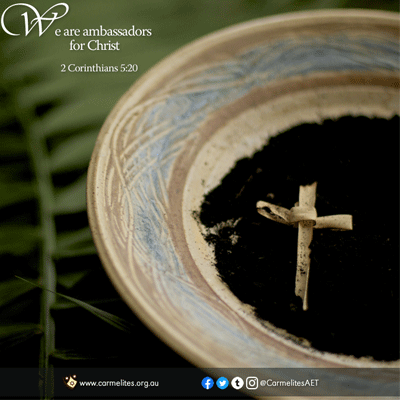 Jesus said to his disciples: ‘Be careful not to parade your good deeds before men to attract their notice; by doing this you will lose all reward from your Father in heaven. So when you give alms, do not have it trumpeted before you; this is what the hypocrites do in the synagogues and in the streets to win men’s admiration. I tell you solemnly, they have had their reward. But when you give alms, your left hand must not know what your right is doing; your almsgiving must be secret, and your Father who sees all that is done in secret will reward you.
Jesus said to his disciples: ‘Be careful not to parade your good deeds before men to attract their notice; by doing this you will lose all reward from your Father in heaven. So when you give alms, do not have it trumpeted before you; this is what the hypocrites do in the synagogues and in the streets to win men’s admiration. I tell you solemnly, they have had their reward. But when you give alms, your left hand must not know what your right is doing; your almsgiving must be secret, and your Father who sees all that is done in secret will reward you.
‘And when you pray, do not imitate the hypocrites: they love to say their prayers standing up in the synagogues and at the street corners for people to see them; I tell you solemnly, they have had their reward. But when you pray, go to your private room and, when you have shut your door, pray to your Father who is in that secret place, and your Father who sees all that is done in secret will reward you.
‘When you fast do not put on a gloomy look as the hypocrites do: they pull long faces to let men know they are fasting. I tell you solemnly, they have had their reward. But when you fast, put oil on your head and wash your face, so that no one will know you are fasting except your Father who sees all that is done in secret; and your Father who sees all that is done in secret will reward you.’ (Matthew 6:1-6, 16-18)
Wearing ashes symbolises our desire for conversion, to turn again towards God. Repentance (conversion) is not so much about feeling sorry for individual sins. It is about changing the direction of our hearts – away from all that limits God’s love and action in us and opening ourselves to a fresh experience of God’s healing love which makes us whole and restores us to our rightful place as beloved daughters and sons in the Kingdom of God. It’s about moving back into right relationship with God and neighbour.
In Lent we begin our journey to the great feast of Easter. That journey begins in ashes today and ends in light at the East Vigil. Fire is a profound part of our national experience. We know its power to destroy, blacken and reduce to ash. We know that evil can do the same - destroy our wholeness of spirit, blacken our lives and reduce the beauty of human life to so much dust.
We begin Lent in the ash of acknowledging our own part in harbouring, creating and doing evil - those places in our hearts where the fire of anger, bitterness, selfishness or narrowness of mind and heart has left nothing but cold ash.
The ash is also a reminder that our true life is not found in mortal things which eventually turn to dust, but in eternal things. We also know that out of ash new life can bud, grow strong, bloom into fullness - that’s the Easter miracle.
Through the Prophet Joel in today’s first reading, God invites us to turn back to him. Our hearts are broken when we realise God’s immense love for us and the fact that ‘he is all tenderness and compassion, slow to anger, rich in graciousness and ready to relent’.
St Paul reminds us that we are ‘ambassadors for Christ’ drawing one another into reconciliation with God, just as Jesus did, so that we might become the ‘goodness of God’ in the world.
Matthew’s Gospel reading provides good advice about doing good deeds, fasting and prayer. We do these with sincerity, not to win other people’s approval. We are striving for integrity between our inner and outer selves on our journey into God’s heart.
In Lent we allow ourselves to be tempted out of the ash of selfishness and narrowness of heart and into a life of open hearted goodness. We celebrate God’s graciousness to us by sharing what we have with those in need whether it be food, wealth, time, love, friendship or compassion. That’s what it means to ‘repent and believe the Good News’.
So our penance is not a self-imposed punishment for sinfulness. It is a sign of our gratitude to God for the forgiveness and healing we receive in Christ.
Whatever form our penance takes it should always result in a benefit for others. For example, our self examination might lead us to know what we need to fast from in order to live better. Perhaps we need to fast from being so critical of each other so that others are spared our negativity; perhaps from too much work in order to be with those we love more; perhaps from our ceaseless activity so that we can put a little breath back into our lives, to spend a little more time becoming aware of God’s presence, making us easier people to live with.
Download our Celebrating At Home for Ash Wednesday:
Celebrating At Home on Ash Wednesday [PDF]
Celebrating At Home on Ash Wednesday [ePub]














